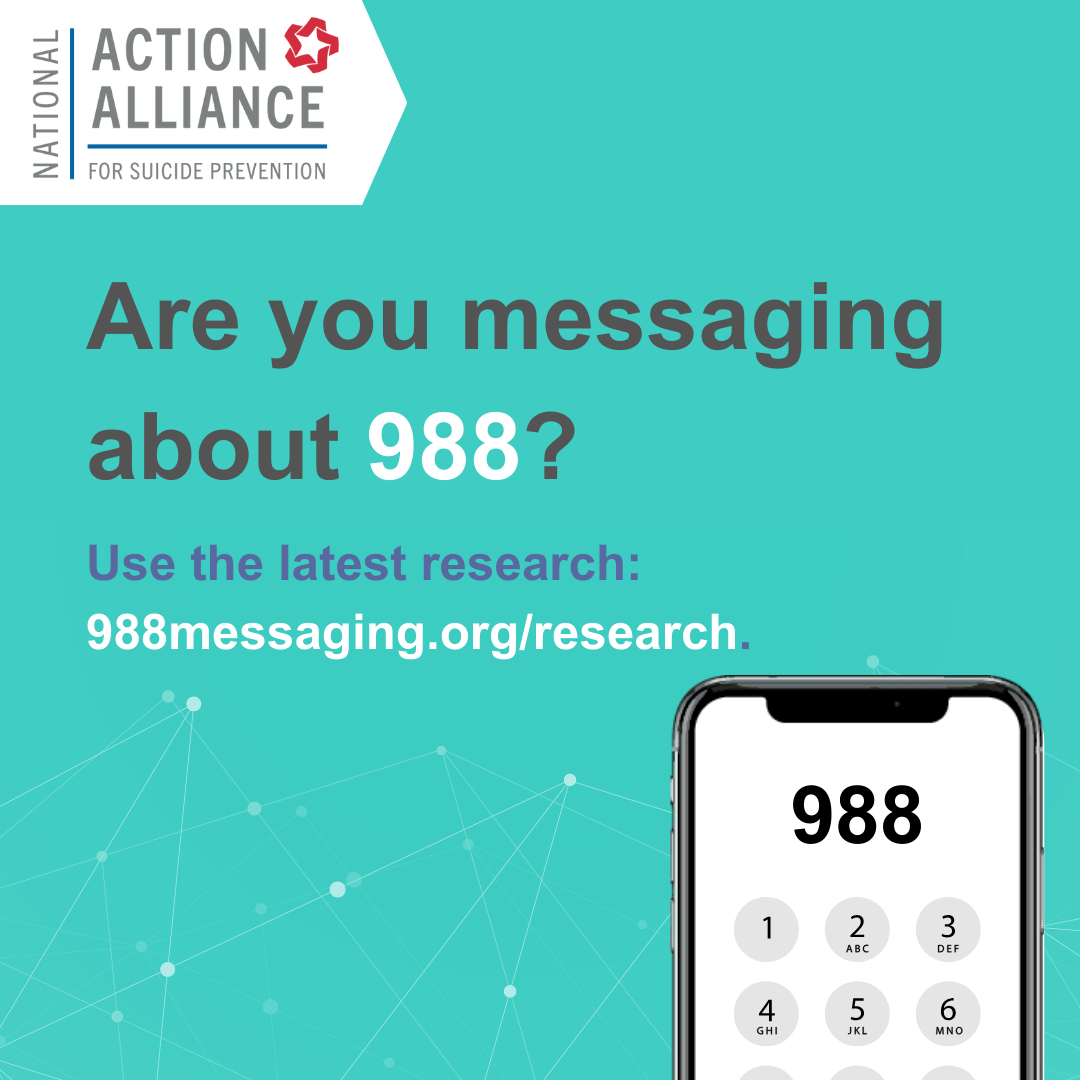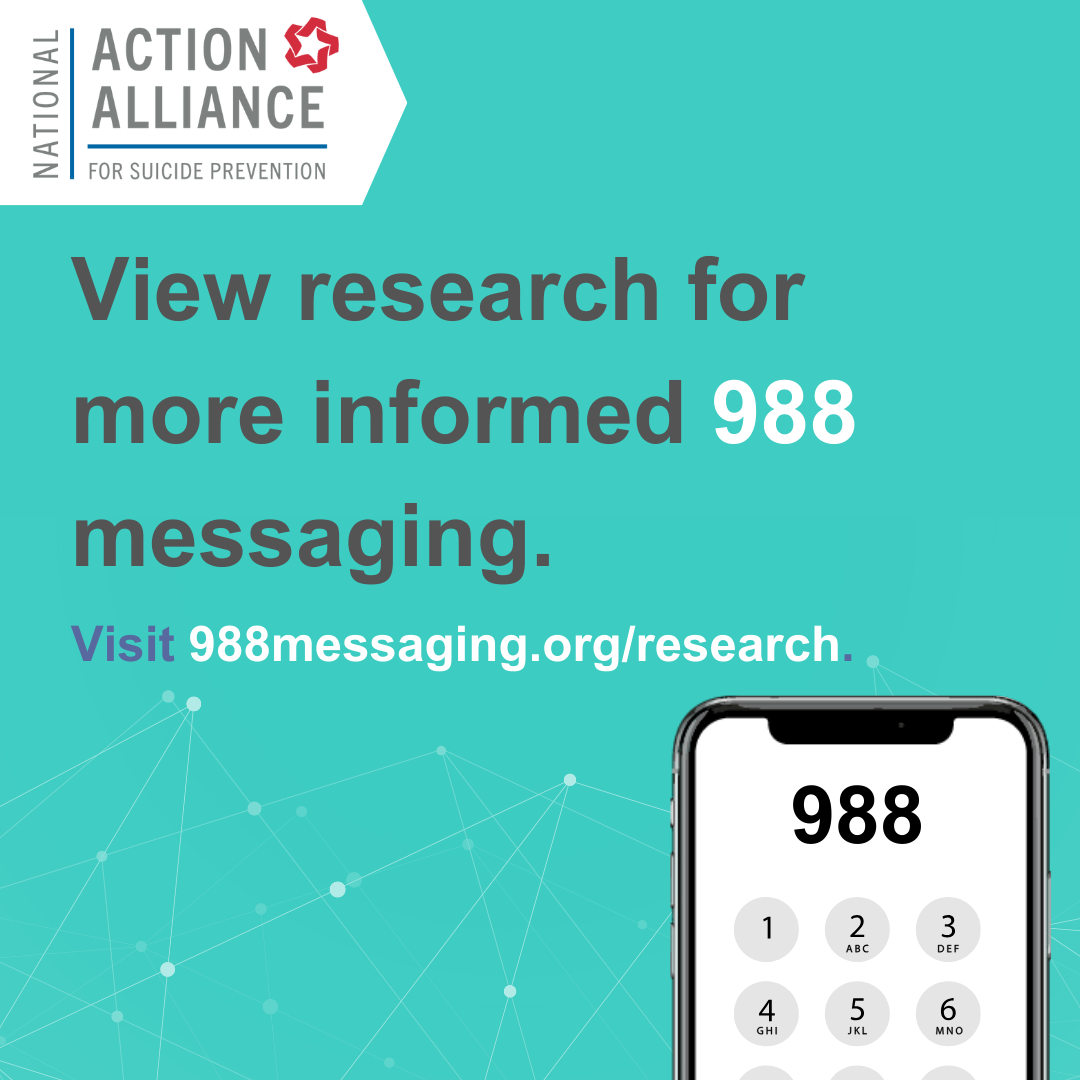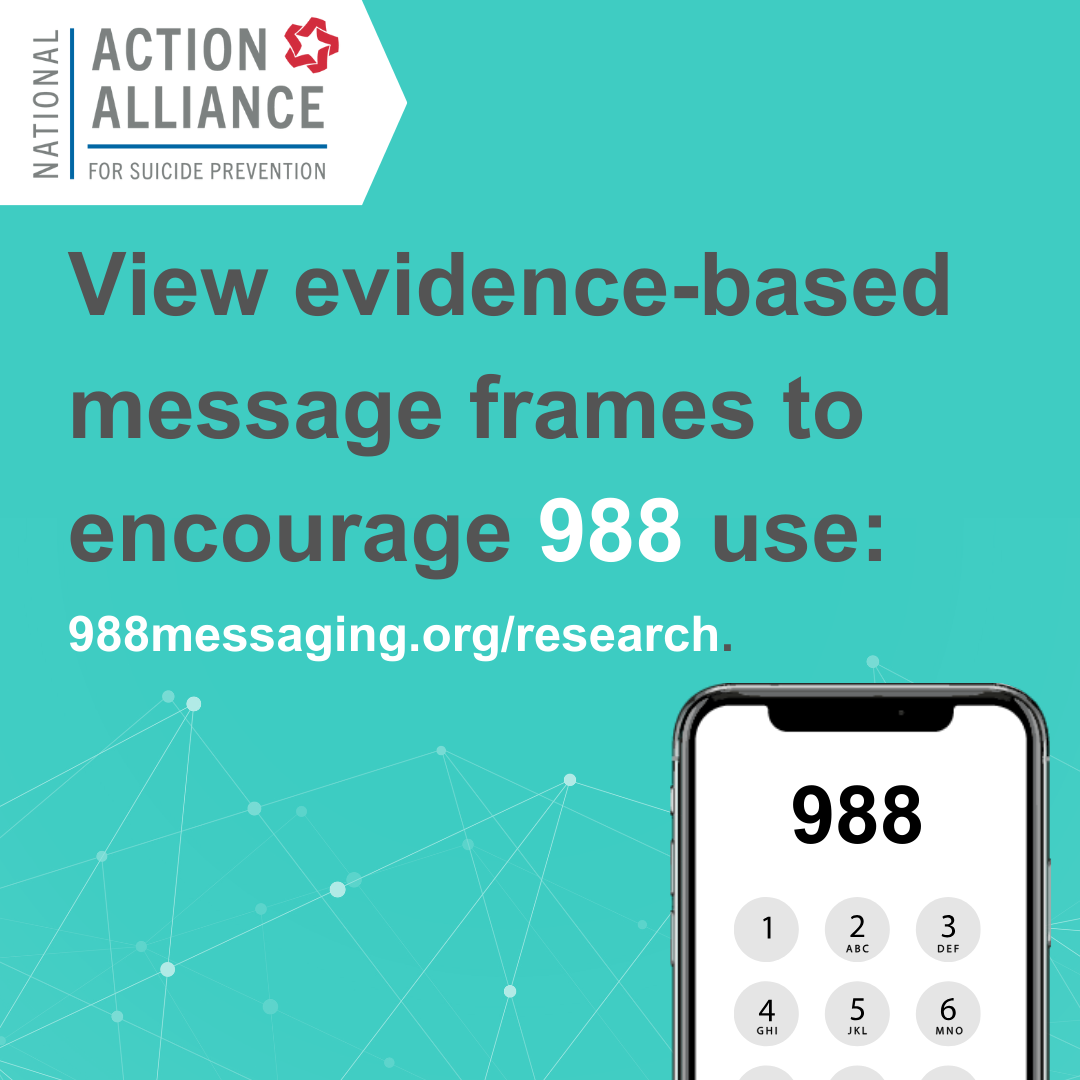Use these resources to inform partners in the fields of suicide prevention, mental health, and substance use disorders about the 988 Formative Research project and research findings.
The 988 Formative Research used qualitative and quantitative methods to uncover insights about 988 and help-seeking behaviors among populations disproportionately impacted by suicide. Findings include:
- Roughly half of the respondents were aware of 988, but most said they don’t know much about it.
- Young adults ages 13-34 (especially those who are Black) and LGBTQIA+ participants (ages 13-49) were more likely than other populations in the study to say they’d use 988, whereas rural older men (ages 49+) were least likely to say they’d use it.
- Those who would consider using 988 when struggling with their mental health found its 24/7 availability most helpful. Other top reasons included:
- The ability to communicate with someone who’s trained to help.
- It’s anonymous.
- The ability to communicate with a real person.
- It’s free.
- Those who would not consider using 988 would not do so due to concerns of:
- Credibility and privacy (especially for rural older men ages 49+).
- Opening up to a stranger (particularly among young adults ages 13-34).
- Someone being called as a result of their contacting 988—like their parents (among teens), law enforcement, or a hospital. This was especially noted among those who have experienced suicidal ideation.
- For receiving information on 988, the majority of study participants would most trust and turn to family and friends, followed by professional healthcare resources.
The most recent 988 Formative Research study uncovered insights about 988 and help-seeking behaviors among four trusted messenger groups for populations that are disproportionately impacted by suicide: mothers/caregivers, siblings, spouses/partners, and friends. Findings include:
- Approximately half of trusted messengers say they’ve heard of 988. Spouses/partners and friends are more likely to be aware/heard of and are somewhat familiar with 988 compared to other groups.
- When they’ve heard about it, trusted messengers are most likely to have heard about 988 being available 24/7 and free.
- Most trusted messengers feel 988 is very/extremely valuable (especially people with Asian American, Native Hawaiian, and Pacific Islander loved ones/close connections).
- The majority of trusted messengers would consider using/recommending 988 when their loved one/close connection is struggling or in crisis.
- Of all the reasons to contact 988, trusted messengers would most consider using 988 to learn how to best support their loved one/close connection when they’re struggling or in crisis.
- Trusted messengers who are not open to using 988 as a resource cited a variety of barriers: privacy concerns, potential damage to relationships, and lack of knowledge.
Access the PPT slide.
New critical research and communications tools for 988 are now available at www.988messaging.org/research. These novel resources are focused on engaging the trusted messengers that people turn to for reliable, unbiased information and help when they’re struggling with their mental health or in crisis. The National Action Alliance for Suicide Prevention (Action Alliance), in partnership with the Suicide Prevention Resource Center (SPRC) and the Ad Council Research Institute, have published the results of a second mixed-methods study describing the attitudes, beliefs, perceptions, barriers, and motivations related to 988 and adopting help-seeking behaviors among trusted messengers identified in the inaugural study, released in 2023. Taken together, these studies provide a strong starting point for better understanding how to reach key audiences and support culturally sensitive, responsive, effective, and successful 988 communications. The project is funded by the Substance Abuse and Mental Health Services Administration (SAMHSA) through the SPRC grant at the University of Oklahoma Health Sciences Center.
The research provides strategic insights and describes audience-specific nuances that can be used by communicators to craft and test more effective and personalized messages and campaigns tailored for each of the trusted messenger cohorts, which included:
- Mothers/Caregivers
- Siblings
- Spouses/Partners
- Friends
These trusted messengers cohorts were identified through the previous study focused on eight populations disproportionately impacted by suicide, which included:
- American Indian and Alaska Native youth and young adults (ages 13-34)
- Asian American, Native Hawaiian and Pacific Islander youth and young adults (ages 13-34)
- Black youth and young adults (ages 13-34)
- Hispanic youth and young adults (ages 13-34)
- Individuals who have attempted suicide or experienced serious thoughts of suicide during their lifetime (ages 18+)
- LGBTQIA+ youth and adults (ages 13-49)
- People with disabilities (ages 13+)
- Rural older men (ages 49+)
The 988 Formative Research offers insights that can be used by the field to make informed decisions about how to raise awareness of and instill trust in 988 among populations disproportionately impacted by suicide and their trusted messengers. This research also generated evidence-based message frames for each study audience that can be tested, validated, and enhanced through additional message testing and research. Additional research efforts among other populations disproportionately impacted by suicide will be critical. Access the full reports and communications toolkits at www.988messaging.org/research.
- The @Action_Alliance, @SPRCtweets & @AdCouncil released NEW #988FormativeResearch about the trusted messengers to people disproportionately impacted by suicide to support culturally sensitive, effective 988 communications: 988messaging.org/research. @988lifeline @samhsagov @EDCtweets
- Use the NEW #988FormativeResearch for trusted messengers to help make more people aware of 988 and instill trust and confidence in the crucial service. View evidence-based research: 988messaging.org/research. @Action_Alliance @SPRCtweets @AdCouncil @988lifeline @samhsagov @EDCTweets
- We encourage you to use the NEW #988FormativeResearch to help inform messaging and communications about 988 to trusted messengers. Learn more: 988messaging.org/research. @Action_Alliance @SPRCtweets @AdCouncil @988lifeline @samhsagov @EDCTweets
Please use #988FormativeResearch and tag us in your social media posts:
Twitter (X): @Action_Alliance, @SPRCtweets, @AdCouncil, @988lifeline, @samhsagov, @EDCTweets
Facebook: @ActionAlliance, @SuicidePreventionResourceCenter, @AdCouncil, @988 Suicide & Crisis Lifeline, @SAMHSA, @EDC.worldwide
LinkedIn: @National Action Alliance for Suicide Prevention, @Suicide Prevention Resource Center, @Ad Council, @Substance Abuse and Mental Health Services Administration (SAMHSA), @EDC (Education Development Center)
Instagram: @adcouncil, @988lifeline, @samhsagov
Watch the recording of a webinar that previews findings of the 988 Formative Research on populations disproportionately impacted by suicide (November 2023). Watch the recording of a webinar that presents findings of the 988 Formative Research on trusted messengers (May 2024).
SAMHSA’s 988 Partner Toolkit is a one-stop shop for social media, video, print, radio, FAQs, messaging, and other marketing materials for anyone to use to promote awareness of 988.




